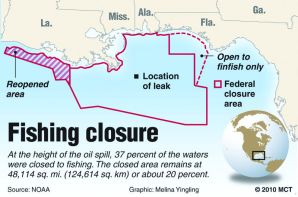For months, America watched.
A nation sat, watching as millions of gallons of crude oil spilled into the Gulf of Mexico. An oil company scrambled as stocks fell and money dried up. A government tried to stay calm as fingers were pointed without any real solution.
All the while an ecosystem was ravaged beyond comprehension, with damage that will never completely be fixed and locals seeing their entire life’s work fall apart.

For the inhabitants of the waters and land in and around the Gulf of Mexico, the Deepwater Horizon blowout was another hard blow in a soft spot. Louisiana, the Florida Panhandle, parts of Mississippi, Alabama and Texas all felt the negative effects.
Now that the spill has stopped and the recovery has begun, what’s next for this area?
The delicate bayou ecosystem of the area is facing problems on every level, starting from the lowly plankton, an organism not seen nor heard but the backbone of the food pyramid.
Many plankton have consumed oil microbes, confusing them with their normal food sources, smaller plankton and bacteria. Scientists are unsure of the effect this will have on the plankton themselves and the other organisms that rely on plankton as a food source.
Tainting the bottom of the food pyramid could cause the entire thing to collapse.
For larger animals, the oil is threatening to completely wipe out species. Several types of turtles already on the endangered species list are in the affected area.
The oil in the water also has the chance of lowering the oxygen level in the ocean itself, threatening the lives of millions of fish.
The delicate balance of chemicals in the sea has been thrown off. It’s like if the air we breathe suddenly becoming fundamentally different.
The ramifications of the gusher can’t be estimated and will not truly be understood by academics and scientists for many years.
Another important organism in the area that is reeling from the disaster are the people. The area around the Gulf is known for its culture, tourist attractions and food. The locals are suffering as their many sources of income, tourists and fish are fleeing.
As the oil clean up began to have an effect, the Coast Guard began to re-open sections of the gulf for fishing. The Louisiana Department of Health and Hospitals has been issuing bi-monthly reports of their activity, sampling seafood throughout the Gulf and testing it for anything that could cause concern. The latest, published on Aug. 23, shows that none of the seafood sampled had dangerous levels of any harmful substances.
Resorts along the coast are not having as easy of a time getting back into the swing of things.
During what is normally their most busy time of the year, the summer holiday, hotels across the area are empty. In an attempt to show that the area is safe, President Obama and his daughter Sasha took a dip in the waters of the coast of Florida near Panama City Beach.
The tourism in the area will take longer to bounce back and the longer it takes the bigger economic toll it will have.
Both economically and ecologically, the Gulf and its shores need a lot of attention.


